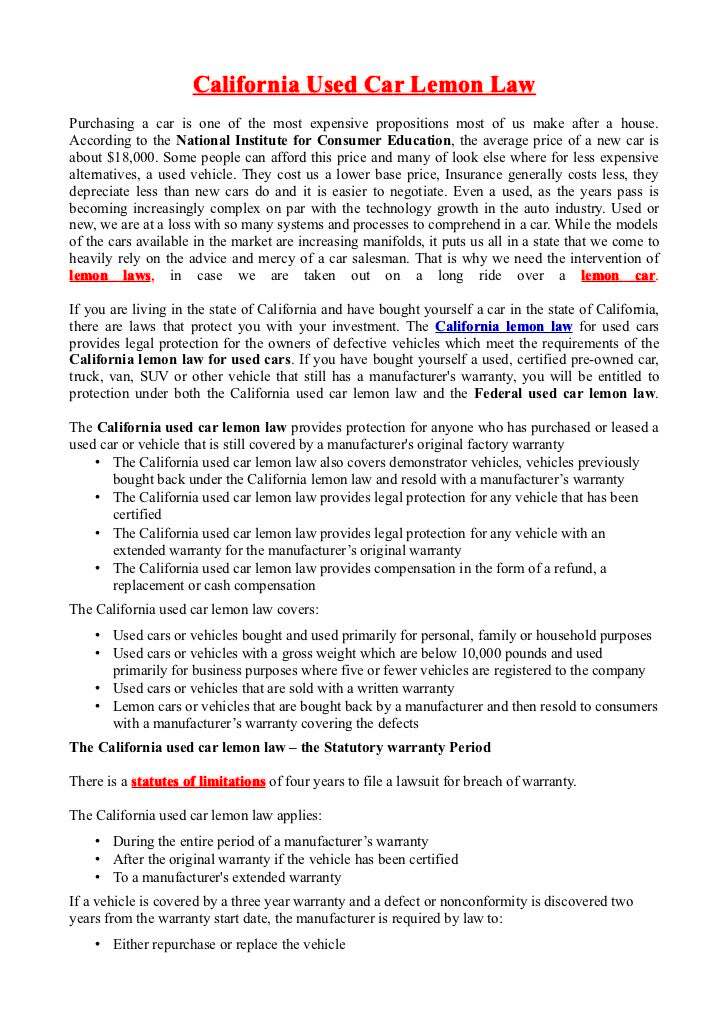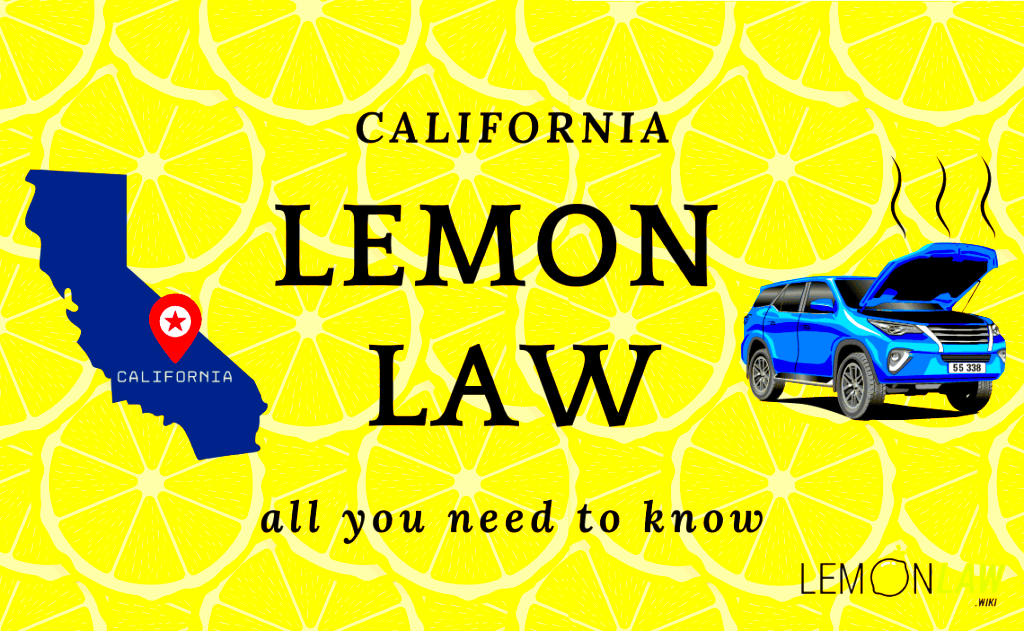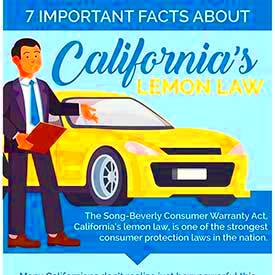Lemon Law for California Used Cars in Private Party Sales
Lemon Law in California is designed to protect consumers who purchase defective vehicles. If you find yourself stuck with a car that has persistent issues, this law may be your lifeline. It provides a way to seek compensation or a replacement vehicle from the manufacturer. California’s Lemon Law covers new and used cars, giving buyers confidence when making a purchase. Let’s dive into the specifics of this law and what it means for you as a consumer.
What is a Lemon Car

A lemon car is a vehicle that has significant defects that impair its use, safety, or value. These issues typically must occur within the warranty period and cannot be fixed after a reasonable number of attempts. Here are some common signs that your car may be a lemon:
- Frequent Repairs: If you find yourself taking your car to the shop repeatedly for the same issue.
- Serious Safety Concerns: Problems that affect the vehicle’s safety, such as brakes or steering issues.
- Unreliable Performance: The car stalls or breaks down unexpectedly.
In California, lemon laws apply if your vehicle has these defects and you’ve given the manufacturer a fair chance to fix them. Understanding what qualifies as a lemon can help you determine if you are eligible for a claim.
Eligibility Criteria for Lemon Law Claims

To file a successful Lemon Law claim in California, certain criteria must be met. Here’s what you need to know:
- Warranty Coverage: The car must be covered by a warranty, whether it’s a manufacturer’s warranty or an extended warranty.
- Defect Severity: The defect must be significant enough to affect the vehicle’s use, safety, or value.
- Reasonable Repair Attempts: You must have given the manufacturer or dealer a reasonable number of attempts to fix the problem, typically two to four times for the same issue.
- Timeframe: The defect must occur within a certain timeframe, usually within the first 18 months or 18,000 miles of ownership.
If your situation meets these criteria, you may be eligible for a refund or a replacement vehicle. It’s essential to document all repairs and communications with the dealer or manufacturer, as this evidence will support your claim.
Process of Filing a Lemon Law Claim
Filing a Lemon Law claim in California can seem daunting, but breaking it down into steps makes it manageable. Here’s a straightforward guide to help you navigate the process:
- Document Everything: Keep detailed records of all repairs, communications with the dealer, and any correspondence with the manufacturer. This documentation is crucial for your case.
- Notify the Manufacturer: Write a formal letter to the manufacturer stating the issues with your vehicle. Give them a chance to address the problems.
- Request Repairs: Ensure that you have allowed the manufacturer a reasonable number of attempts to fix the issue. This typically means giving them two to four chances to resolve the problem.
- Contact a Lemon Law Attorney: If your vehicle is still defective after several attempts, consider consulting a Lemon Law attorney. They can provide guidance tailored to your situation.
- File a Claim: Your attorney can help you file a claim against the manufacturer. This claim will outline the defects, attempts at repairs, and your desired remedy, whether it’s a refund or replacement.
Following these steps can help ensure that you present a strong case and maximize your chances of a favorable outcome.
Private Party Sales and Lemon Law
Many people assume that Lemon Law only applies to vehicles purchased from dealerships. However, California’s Lemon Law also covers private party sales. Here’s what you should know:
- Disclosure Requirements: Sellers must disclose known defects before the sale. If they fail to do so, you may have grounds for a claim.
- As Is Sales: If you buy a car “as is,” it usually means you accept any defects. However, this does not cover undisclosed issues or fraud.
- Documented Repairs: Just like with dealer purchases, keeping records of any repairs is vital. This documentation can support your claim if problems arise later.
Buying a used car from a private party can be risky, but understanding your rights under Lemon Law can help protect you from potential pitfalls.
Common Misconceptions about Lemon Law
There are several myths surrounding Lemon Law that can lead to confusion. Let’s clarify some of the most common misconceptions:
- Lemon Law Only Applies to New Cars: Many believe that Lemon Law protections are limited to new vehicles. In reality, used cars can also qualify if they have significant defects.
- You Must Sue the Dealer: Some think they have to take legal action against the dealer. However, claims are typically made against the manufacturer.
- All Defects Qualify: Not every issue qualifies under Lemon Law. Only substantial defects that affect safety, use, or value are considered.
- Lemon Law Claims Are Always Easy to Win: While Lemon Law is designed to protect consumers, claims can be complex. Having proper documentation and legal support is crucial.
Being aware of these misconceptions can help you navigate the Lemon Law process more effectively and protect your rights as a consumer.
Possible Remedies under Lemon Law
If you find that your vehicle qualifies as a lemon under California law, you have several potential remedies available to you. Understanding these options can help you make an informed decision on how to proceed. Here are the primary remedies you might pursue:
- Refund: You may be entitled to a full refund of the purchase price, including taxes, registration fees, and any other associated costs. This option is typically sought when the defects are significant enough to warrant it.
- Replacement Vehicle: If a refund isn’t the preferred option, you can ask for a replacement vehicle of similar value. This is often the choice when you still want a vehicle but not the one that has been problematic.
- Cash Compensation: In some cases, you may receive cash compensation for the repairs and issues you’ve faced. This option can be beneficial if you choose to keep the vehicle but seek to address the losses incurred.
- Reimbursement for Repairs: If you paid out of pocket for repairs related to the lemon, you could seek reimbursement for those costs.
Choosing the right remedy depends on your specific situation and preferences. Consulting with a Lemon Law attorney can help you understand the best course of action for your case.
Steps to Take if You Have a Lemon
Discovering that you have a lemon can be frustrating, but knowing the right steps to take can help you regain control. Here’s a practical guide on what to do:
- Keep Records: Document every issue you experience with your vehicle. This includes repair receipts, dates, and descriptions of the problems.
- Contact the Dealer or Manufacturer: Notify them about the defects. Be clear and concise in your communication.
- Give Them a Chance to Repair: Allow the dealer or manufacturer a reasonable number of attempts to fix the problem. This is often two to four attempts for the same issue.
- Consult a Lemon Law Attorney: If the issue persists, seek legal advice. An attorney can guide you through the process and help you understand your rights.
- File a Claim: If necessary, work with your attorney to file a Lemon Law claim against the manufacturer. Provide all necessary documentation to support your case.
Following these steps can streamline your experience and increase your chances of a successful resolution.
FAQs
Have questions about Lemon Law? Here are some frequently asked questions that might help clarify things:
- What qualifies as a lemon? A lemon is a vehicle that has significant defects affecting its use, safety, or value, which cannot be repaired after a reasonable number of attempts.
- Can I file a claim for a used car? Yes, California’s Lemon Law applies to both new and used vehicles, provided they meet the criteria.
- How long do I have to file a claim? You typically have four years from the date of the purchase or lease to file a Lemon Law claim.
- Do I need a lawyer to file a claim? While it’s not required, having a Lemon Law attorney can significantly enhance your chances of a successful outcome.
- What if the dealer sold me the car “as is”? Even with “as is” sales, the seller must disclose known defects. If they fail to do so, you may still have grounds for a claim.
If you have additional questions or concerns, consulting a legal professional can provide the clarity you need.
Conclusion
Navigating the complexities of Lemon Law in California can be challenging, especially when dealing with a defective vehicle. However, understanding your rights and the steps you can take makes a significant difference. Remember, whether you purchased from a dealership or a private party, Lemon Law protections are in place to safeguard consumers. If you suspect you have a lemon, keep detailed records, notify the manufacturer, and consider consulting a Lemon Law attorney to guide you through the claims process. By being informed and proactive, you can seek the remedies you deserve and find a resolution to your vehicle troubles.


